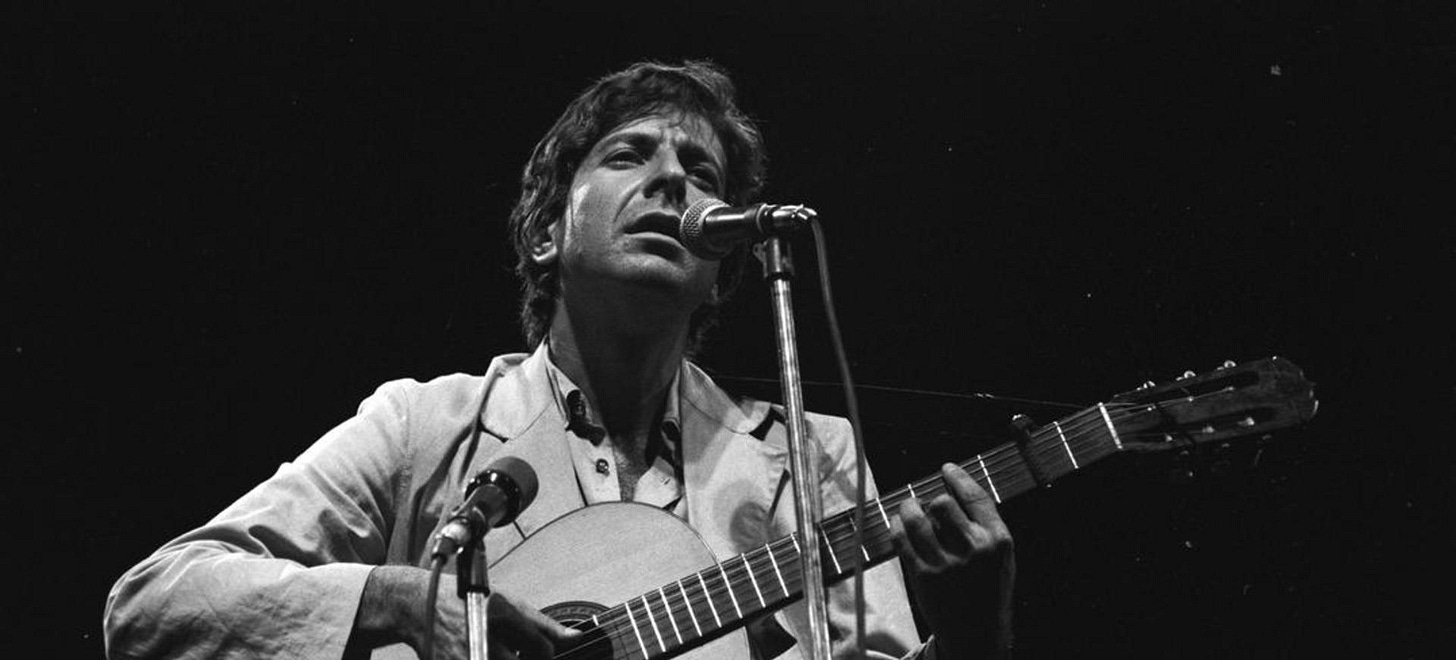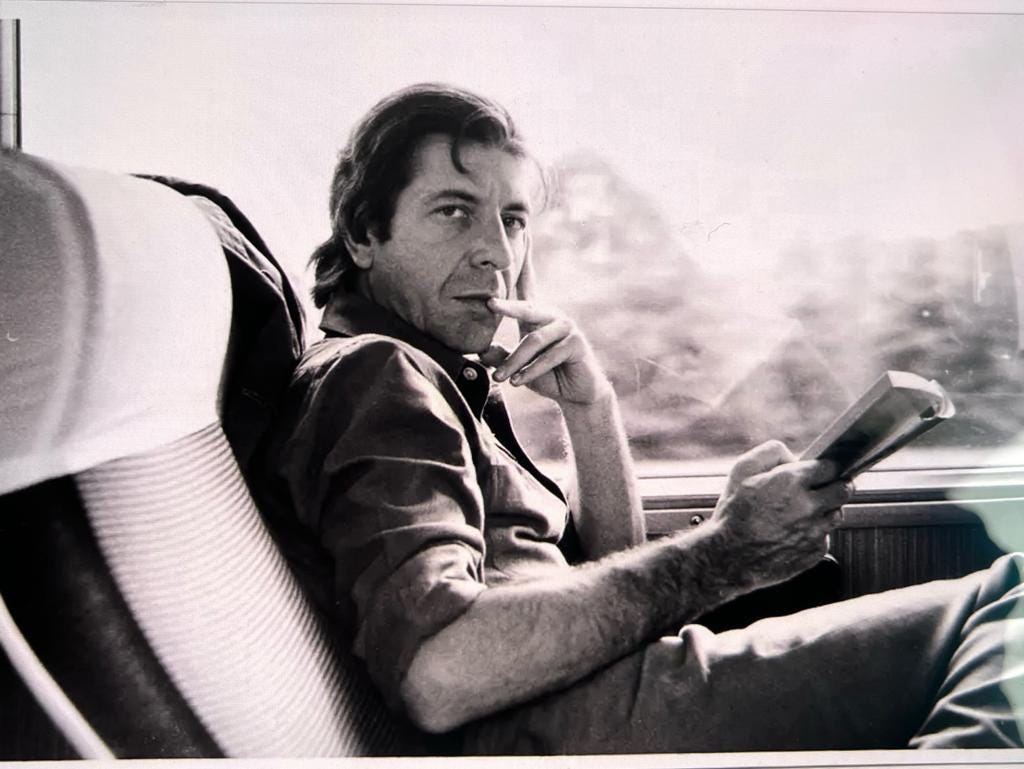I Grew Up With Leonard Cohen
(on songs as life-markers)
I remember, to a fussy detail, when Leonard Cohen first came into my life. It was the summer of 1975.
I was at a friend's house. His elder brother had just come back from London. My friend was incredibly excited. "You have to listen to this album bhaiya got. I've never heard of this singer. But, god, the voice!"
He put on the LP into one of those beautiful now-antique record players, and from the speakers emanated a voice which seemed to come out of the earth, burnished and soiled, with a strange primordial pain, but polished, polished - definitely a voice from a mysterious part of the universe.
The lyrics made no sense, but the words seeped under our skin. "Suzanne takes you down to her place near the river / You can hear the boats go by, you can spend the night beside her / And you know that she's half-crazy but that's why you want to be there / And she feeds you tea and oranges that come all the way from China."
We were teenagers, and we caught the longing and the love in the song. And all we wanted was a girl like Suzanne. There was something mystical about her which made us ache. "Suzanne takes your hand and she leads you to the river / She's wearing rags and feathers from Salvation Army counters / And the sun pours down like honey on our lady of the harbor / And she shows you where to look among the garbage and the flowers / There are heroes in the seaweed, there are children in the morning / They are leaning out for love and they will lean that way forever / While Suzanne holds the mirror."
What is a girl like Suzanne made of, we wondered? Fireflies and stars? Midnight and flowers?
My friend and I must have heard Suzanne a hundred times that summer.
Those were growing-up years, of angst and conflict, with the brother, mother, with anyone who tried to interpret me or modify me or tell me to do something their way. And I used to lash out, shout - only to moan of my insensitivity to myself.
And I used to wonder - how could I hurt those whom I loved the way I did? And then I heard Cohen sing "...like a baby, stillborn / Like a beast with his horn / I have torn everyone who reached out for me."
It didn't resolve anything, but did made me realize that there was a confederation of allied hurting and hurt souls in this big wide universe.
A lot of teenage love is about longing and transience. There's that sweet joy, and that incredibly sweet pain. And a lot of it is waiting, expecting, waiting. Of course, Cohen helped me understand it all. "And I choose the rooms that I live in with care / The windows are small and the walls almost bare / There's only one bed and there's only one prayer / I listen all night for your step on the stair".
Time and again, he defined love in ways that it rose above the cliches and made it celebratory, beautiful, something which one could lie gently with or merely fly on the wings of. "I loved you in the morning, our kisses deep and warm / Your hair upon the pillow like a sleepy golden storm / Yes, many loved before us I know that we are not new / In city and in forest they smiled like me and you".
And when the inevitable heartbreak came, when everything seemed broken and dark, Cohen again came, crooning. “Ring the bells that still can ring, / Forget your perfect offering, / There is a crack, a crack in everything, / That’s how the light gets in.” The whole lesson of finding a path through heartbreak - or anything which seeked to break you - came out in the essence of a few lines.
Later, much later, tired of all the noise in my life, and the competition, and the swirling preoccupations which filled every gap available in my space and being, I hunted for solutions. And then I stumbled upon a book written by my favorite author Pico Iyer of a meeting and conversation he had with Cohen. He'd gone to meet Cohen, his childhood hero, in a Zen Center on San Gabriel Mountains outside Los Angeles, where Cohen had found refuge for almost five years. And one perspicacious insight after another flowed from this conversation with Cohen.
"It’s only by taking myself away from clutter and distraction that I can begin to hear something out of earshot and recall that listening is much more invigorating than giving voice to all the thoughts and prejudices that anyway keep me company twenty-four hours a day. And it’s only by going nowhere — by sitting still or letting my mind relax — that I find that the thoughts that come to me unbidden are far fresher and more imaginative than the ones I consciously seek out."
"Going nowhere … isn’t about turning your back on the world; it’s about stepping away now and then so that you can see the world more clearly and love it more deeply."
I learnt of courage of intention and focus of purpose.
"It takes courage, of course, to step out of the fray, as it takes courage to do anything that’s necessary - whether tending to a loved one on her deathbed or turning away from that sugar-coated doughnut."
And as I struggled between my interests, my ideals and my compulsions of livelihood, here was Cohen again, talking about the price that the heart must pay for acting against our ideals, truth, or God.
I was always working steady
But I never called it art
I got my shit together
Meeting Christ and reading Marx
It failed, my little fire
But it spread the dying spark
Go tell the young messiah
What happens to the heart
And as if he wanted to leave something as a final gentle guide to life and living, Cohen left this beautiful song, to which I return time and again -
Listen to the hummingbird
Whose wings you cannot see
Listen to the hummingbird
Don't listen to me
.
Listen to the butterfly
Whose days but number three
Listen to the butterfly
Don't listen to me
.
Listen to the mind of God
Which doesn't need to be
Listen to the mind of God
Don't listen to me
.
Listen to the hummingbird
Whose wings you cannot see
Listen to the hummingbird
Don't listen to me
I have never heard of more outstanding versions than of Cohen songs. And one of them - Hallelujah - is probably the song, in the history of songs, with the most versions ever! Below a few of my favorites!
This incredibly rousing and resounding version of Hallelujah gets me everytime I hear it!
“Who by fire” is Leonard Cohen’s version of the Hebrew prayer "Unetanneh Tokef", chanted on Yom Kippur.
The prayer Cohen heard as a child in the synagogue describes God reviewing the Book of Life and deciding the fate of every soul for the year to come – who will live, who will die and how. According to Cohen that element of doubt is what made the song into a personal prayer for him.
This version has a surprising crowd-assisted refrain, which I love so much!
And If It Be Your Will, to end this newsletter. This song brings a tear to my eye every time I hear it. Leonard introduces this version of the Webb Sisters. There is so much sweetness and sadness and acceptance in this incredible song.
Are you a fan of Leonard Cohen? Which are the songs you love most, and return to again and again? Do tell in the comments.




I loved this.
Was introduced to Cohen by Susan's Cain's book - Bittersweet. You will probably enjoy it too.
Well, it's a lovely piece, I like music and a song like Suzanne is definitely poetry in my book. There's a Dutch cover that is magical, too.
Thank you for writing beautiful posts, Sunil.